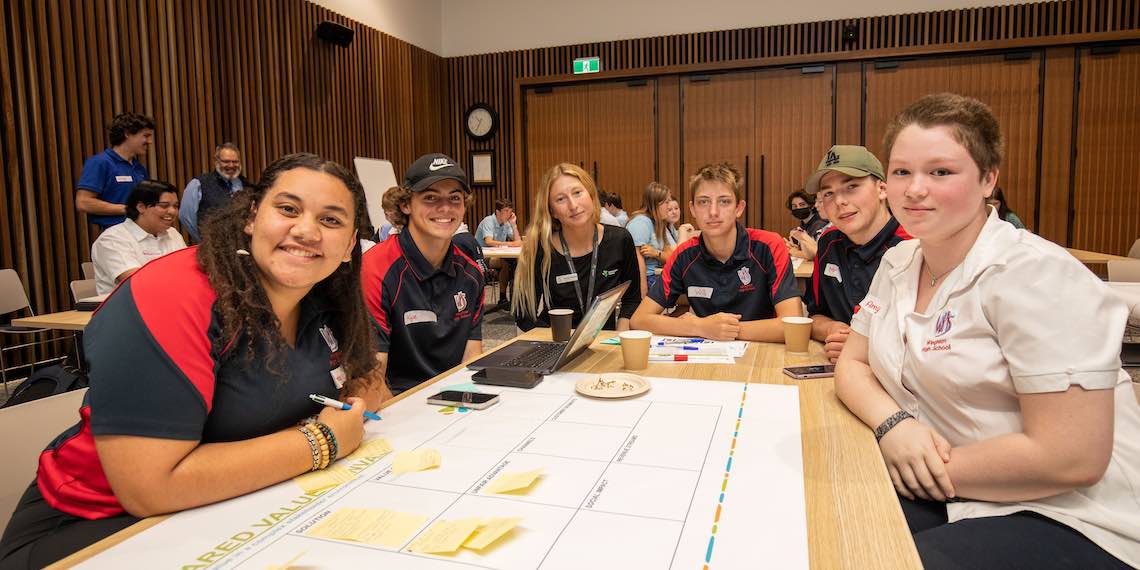Youth engagement set to inform council’s long-term water strategy

Dozens of senior high school students descended on MidCoast Council’s Administration and Customer Service Centre last month for the council’s first ever Youth Hackathon for Water, a special one-day event designed to inform the region’s long-term water strategy.
Students were plunged into a fast-paced, competitive environment, working together in teams to brainstorm solutions to some of the region's biggest water-related challenges, including climate change, water security and wastewater management.
MidCoast Council Water and Systems Executive Manager Marnie Coates said the event tapped into the values of the younger generation while facilitating a space for the region’s youth to share their ideas about how best to tackle issues.
“With our long-term water plan, Our Water Our Future 2050, currently being developed, it’s really important we hear from young people about their vision for water on the MidCoast, as they’re going to be living with a lot of the decisions we make,” she said.
“A hackathon provides a fun, practical format for us to hear from this demographic and find out where their values lie when they think about making sure we have enough water and our impact on the environment.”
Coates said the event was a great success, with 40 senior students representing six different high schools taking part.
“We asked them to break into teams of four or five and work together to develop a solution to one of three problems that we presented to them,” she said.
“The problem statements were based on the key strategic issues that we are addressing through our long-term water strategy. They are the issues most critical to our region, including water security, sustainable effluent management, and climate change.”
Hacking water challenges
Coates said the problem statements aimed to get the students thinking about: having enough water for communities and the environment; maximising use of recycled water and gaining public acceptance; and reducing the impact of climate change on waterways and the urban water cycle.
“It was really interesting, what we saw on the day. We found that a lot of the groups considered the exercise holistically,” she said.
“They were looking for solutions that ticked off on all three of the problems, even though they were only asked to address one. They recognised that all of these problems were connected.”
And while the students came up with some amazing ideas, Coates said another interesting observation was that most of the solutions focused on a few key themes.
“They were very environmentally focused, looking at natural, sustainable solutions that would combat climate change and water quality issues in the catchment,” she said.
“The other school of thinking was mainly around individual households’ responsibility to use the water on their property as efficiently as possible. Capturing rainwater and reusing water on residential properties was a key recommendation from the students.
“It was really interesting. The students were all for recycled water, as well as decentralisation.”
Coates said the room was brimming with innovation, with lots of small-scale recycling schemes and wetland-related ideas suggested, as well as desalination and ways to use green energy to make sure treatment processes were sustainable.
“There was some quiet contemplation at the start of the day, but, as their ideas started flowing, the room got really noisy as the students got stuck right into developing their solutions and nutting out the problems they were coming against along the way,” she said.
“This is really difficult stuff. But some of these teams had done full cost assessments, looked at social impact, as well as potential cost-recovery options. The range and depth of what they were able to come up with was pretty incredible.
“We were amazed with what they were able to achieve in such a short amount of time.”
Coates said the students' capacity for technical insight and research was particularly impressive, adding credibility to their suggestions.
“What really impressed me was that their opinions were based in fact. It wasn’t pie in the sky thinking. These kids know how to use technology, they were researching on the run, and there was a high level of technical competency in some of their solutions,” she said.
Sharing insights
The students presented their ideas to a judging panel, including MidCoast Council Mayor Claire Pontin, Taree Aboriginal Elder Uncle Will Paulson, NSW Water Directorate Executive Officer Brendan Guiney, Taree Young Citizen of the Year 2022 Hailey Trudgeon and Student for Climate Action Leader Elise Rourke.
“We had two teams that were awarded equal first place. Both teams were tackling climate change in different ways,” Coates said.
“One solution involved artificial wetlands development and the other looked at embankment stabilisation using drone seed planting, which was a pretty cool idea.
“We will be collating all of their ideas and including anything that hasn’t yet come up previously in our long list of options for consideration moving forward.”
The winning teams will also have the opportunity to present their solutions to the Our Water Our Future Community Group in early 2023, Coates said.
“We are asking several teams to come back to our broader Our Water Our Future 2050 Community Group and present their ideas. The group includes members of the community, some MidCoast Council staff, and also representation from our regulators,” she said.
“It will be really valuable to the students to present some of their ideas to that group. It’s an older demographic, and for them to hear straight from young people about how they’re thinking through these issues facing our region going forward is really important.
“Hearing these students talk about their ideas around recycled water will hopefully help to persuade people in the older generation that this might be a good thing to do to ensure water security in future.”
